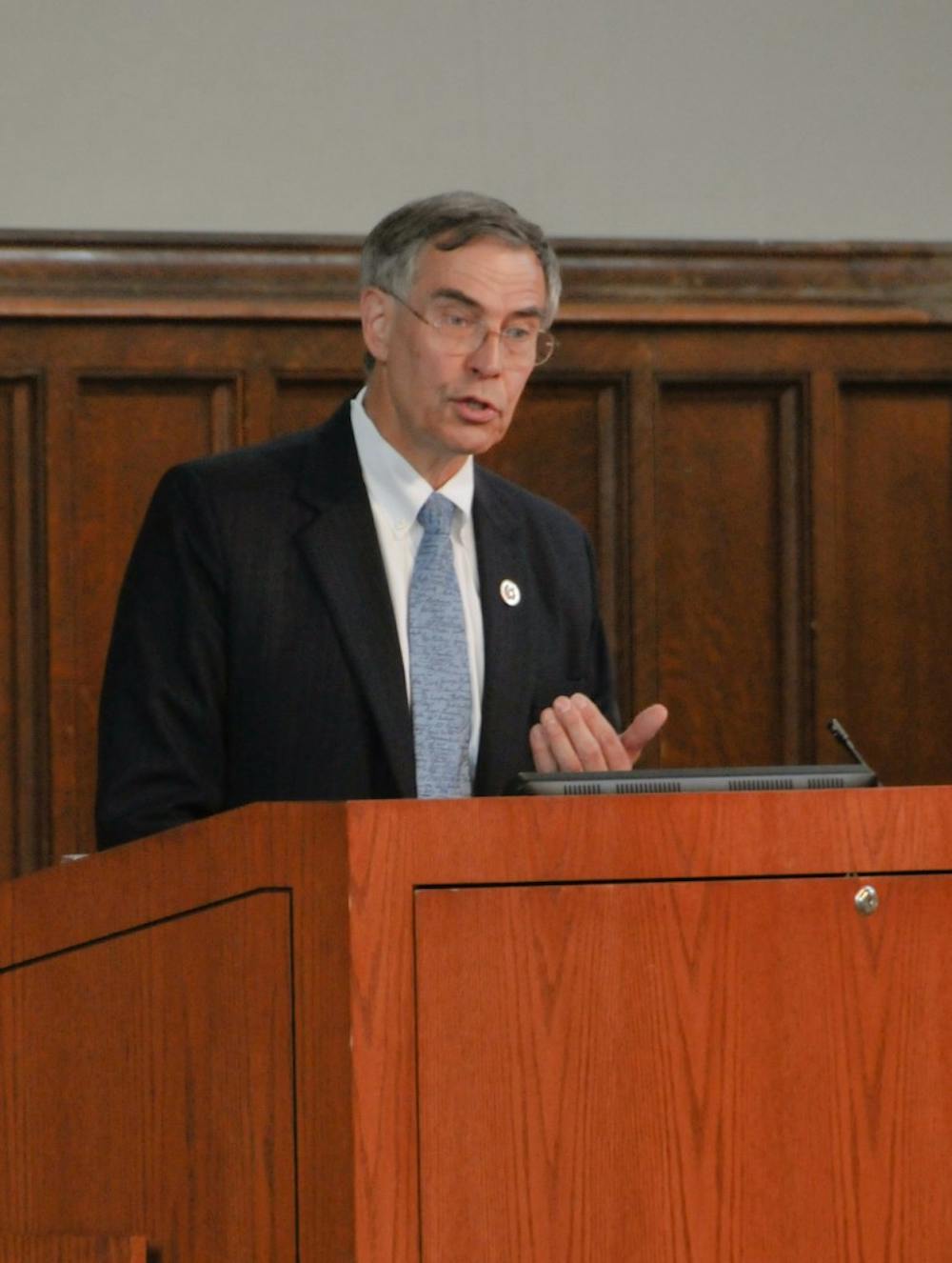 The significance of the Fourth Amendment to the U.S. Constitution lies in the principle of equality that it establishes between citizens and the federal government and in a citizen’s freedom from unwarranted suspicion, U.S. Representative for New Jersey’s 12th congressional districtRush Holt said in a lecture on Tuesday.
The significance of the Fourth Amendment to the U.S. Constitution lies in the principle of equality that it establishes between citizens and the federal government and in a citizen’s freedom from unwarranted suspicion, U.S. Representative for New Jersey’s 12th congressional districtRush Holt said in a lecture on Tuesday.
Holt was referring to the Constitution’s mandate that searches not be conducted without probable cause and a warrant that describes specifically what is to be searched and seized.
For the framers of the Constitution, searches were not so much regarded as violations of privacy — a vaguely defined concept at the time — but as instruments of colonization and subjugation. Indeed, the general warrant searches and writs of assistance carried out on American colonists were much more restricted on the English mainland, Holt noted.
Regarding recent history, Holt faulted Congress for accepting the narrative that 9/11 was a failure of intelligence and that more intelligence needed to be collected. He remarked that Congress failed to wait for the 9/11 Commission’s report, which ultimately concluded that more intelligence likely would not have changed events.
Congress’s approval of the USA Patriot Act removed some of the distinctions between foreign intelligence gathering, for which warrants are not required, and law enforcement, Holt said, adding that the Foreign Intelligence Surveillance Court operates in secrecy. It issues warrants to intelligence agencies, not based on probable cause, but on whether a relationship can be established between the suspect and a “foreign power,” which is not the same as a foreign enemy.
While not discounting arguments in favor of increased homeland security, Holt said people should be mindful that feelings of being threatened extend back to the colonial era of the United States and that no American should be placed in the inferior position of being under suspicion by the government without probable cause.
Holt pointed to a widening relationship between the relative power of the American government and the American people. Henoted the experiences of the American Muslim community —the fact that over half of people on the U.S.’s terrorism watchlist have no known affiliation to terrorist groups —and the case of Brandon Mayfield, a lawyer who became the subject of a terrorism probe even though he had no known connections to terrorism, and probable cause was never established.
People do not waive the expectation of privacy to their metadata, Holt also said.
"Metadata" became a buzzword in the American media after Edward Snowden disclosed the existence of the National Security Agency's PRISM program, which collects information about telephone calls, email and Internet activities, such as their senders and receivers, but not the content of the communications themselves.
A very significant amount of private information, such as sexuality, whistleblower status and abortion history, could potentially be inferred using metadata alone, Holt explained, citing research done by University computer science professor Edward Felten.
“The technological capability to break down, figuratively, 100 computer memory doors does not, or should not, make that any more permissible than breaking into 100 buildings,” Holt said.
Much of the reason data collection on U.S. citizens has persisted is that litigants challenging the collection often lack standing to sue because they cannot be fully sure that data has been collected on them due to the confidentiality of intelligence information, Holt explained.
Intelligence officers also oftenhave not been forthcoming in congressional hearings, and no member of Congress likely fully understood the content of their intricate presentations, Holt said.
In a brief discussion with The Daily Princetonian after the lecture, Holt explained that he viewed the PRISM program as the natural successor to a long list of curtailments of civil liberties in the wake of 9/11. He also said there was a parallel between the present situation and the jurisprudence of Judge Learned Hand, who wrote during World War II about the necessity of preserving civil liberties in the face of threats to national security.
Holt has introduced legislation in this session of Congress, which proposes to repeal the Patriot Act and the related FISA Amendments Act.
The lecture, titled “Search and Seizure in the Snowden Era,” took place in McCosh 50 at 4:30 p.m. It was co-sponsored by the Program in American Studies, the James Madison Program in American Ideals and Institutions, the Program in Law and Public Affairs and the Center for African American Studies.







